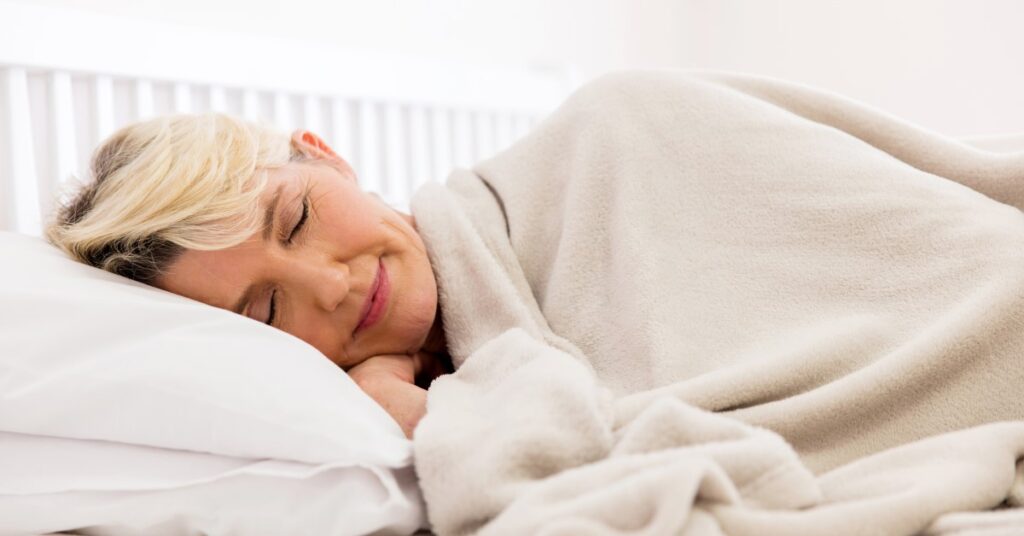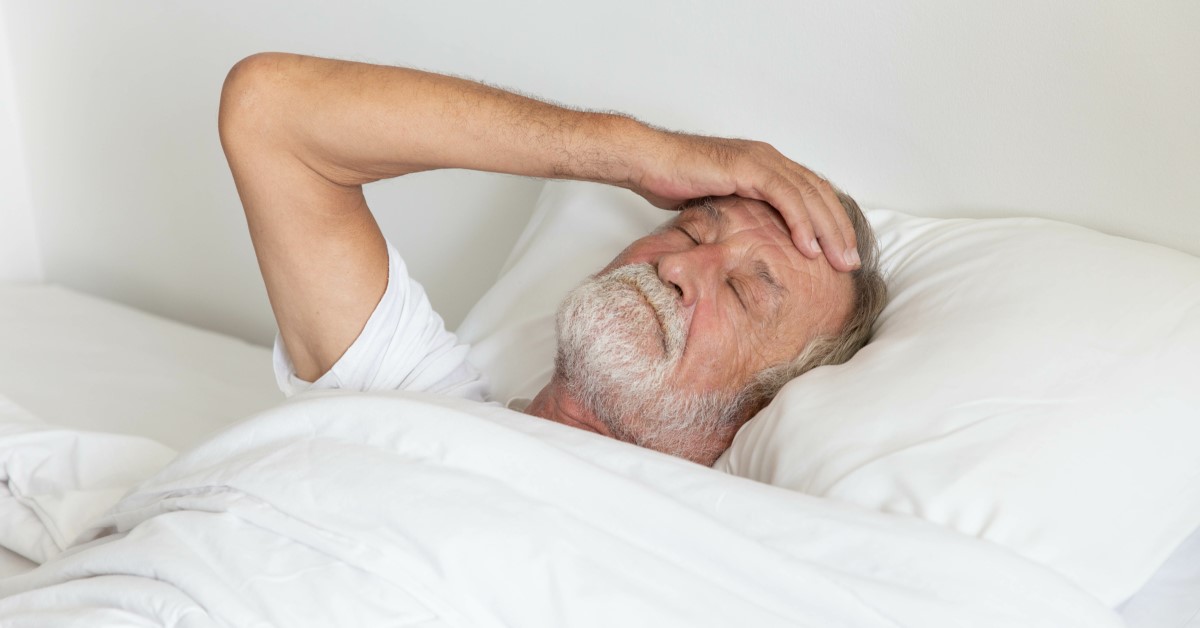
Medically reviewed by
Dacelin St Martin, MD
Triple board-certified in Sleep Medicine,
Internal Medicine, and Pediatrics.
Why Does Sleep Change with Age? | How Does Sleep Change with Age? | Early Morning Awakening | Afternoon Naps | Longer Sleep Schedule Recovery | Common Sleep Problems in Old Age | Sleep Advice for Seniors
Overview
Aging comes with a host of physical and mental concerns, and sleep issues are often at the top of the list.
It’s common for older people to experience problems initiating sleep, waking up too early, or feeling unrefreshed during the day.
Although experts recommend that adults, including seniors, get seven or more hours of sleep every night, many older adults only sleep for a short time.
From an older person’s perspective, these sleep problems might appear unprecedented. However, studies suggest they should be anticipated, as sleep changes as we age.[1]
This article explains how sleep patterns change with age and provides tips for helping older adults sleep better.
Why Does Sleep Change with Age?
Many experts believe changes in one’s internal body clock are responsible for age-related sleep alterations.
The body’s internal clock comprises a group of cells in the human brain called the suprachiasmatic nucleus (SCN).[2]
These cells are responsible for human circadian rhythms, which modulate the wake-sleep cycle, hunger, body temperature, and many other bodily functions.
As people age, their cells, including those of the body’s internal clock, age, too, impacting the internal clock’s function and deteriorating its ability to regulate sleep.[1]
Studies also suggest that sleep could change as one gets older because of underlying health problems.[3]
Many chronic medical problems, like heart disease, diabetes, and osteoporosis, are linked to old age. These illnesses often negatively impact sleep.
Also, the fact that many older people have two or more health problems exacerbates their sleep even more.
Studies show that older people with more than one health problem are more likely to say they sleep less than six hours a night or have insufficient sleep.
In addition, sleep problems among older people could be caused by the side effects of medicines.
A brilliant American survey shows that about forty (40) percent of seniors over 65 in the United States (US) take at least five drugs.[4]
Many of these medicines can cause sleep problems, and an interaction of these drugs can have unexpected effects on sleep.
Some experts also think that peculiar lifestyle changes associated with aging could change sleep habits.
For instance, retirement causes seniors to spend more time indoors, reducing their exposure to sunlight, an essential stimulus for controlling the wake-sleep cycle.
How Does Sleep Change with Age?
Getting older has varying effects on people’s sleep. While some older people may not have significant sleep problems, others are unhappy with their shorter sleep periods and poorer sleep quality.
Here are some common changes in sleep that come with getting older;
Early Morning Awakening
Many older people report waking up earlier than they used to. Experts believe this is due to age-related changes in sleep architecture.
Older folks spend more time in the initial, lighter phases of sleep and less time in the later, deeper ones.
These changes may cause older adults to wake up more frequently at night and have more fragmented sleep.
Afternoon Naps
Older people tend to take more afternoon naps than younger adults. This finding could be because elderly people are usually retired, spend more time at home, and get tired more easily.
While some sleep experts believe that a brief daytime nap is healthy, many agree that lengthy daytime napping might make it difficult to fall asleep in the evening and cause sleep disturbances.
Longer Sleep Schedule Recovery
Circadian rhythm variations in elderly adults make it harder to respond to rapid sleep schedule changes, such as daylight saving time or jet lag.
Common Sleep Problems in Old Age
Older adults could experience many sleep problems. Some of the common ones include:
1) Insomnia
One of the most common sleep problems in older people is falling or staying asleep. Age-related circadian rhythm changes seem to be the major contributor to insomnia in the elderly.
2) REM Sleep Behavior Disorder
Studies show that REM sleep behavior disorder is commoner among men and older adults above 50 years [3]. This disorder can cause people to physically play out their dreams, often in a violent manner.
3) Restless Legs Syndrome (RLS)
This sleep disorder causes a need to move the legs at night due to uncomfortable sensations. Also, persons with RLS feel restless and have difficulty falling asleep. RLS is more common as people age, affecting up to 10 percent of older people.[5]
4) Obstructive Sleep Apnea (OSA)
Obstructive sleep apnea causes pauses in breathing while sleeping. These pauses occur as the upper airway collapses or narrows. While anyone could have sleep apnea, it is most common after the age of 40. Sleep apnea disrupts sleep and can reduce oxygen levels, resulting in headaches and daytime tiredness.
Sleep Advice for Seniors
There are a lot of things people can do to sleep better. A lot of the time, they involve working on good sleep hygiene and making habits that help you sleep well. Some of them are;
- Maintain a Regular Sleep Schedule: As people age, recovering from sleep loss becomes increasingly difficult. Therefore, older people must avoid abrupt changes to their sleep schedules and maintain a consistent sleep time.
- Develop a Soothing Bedtime Routine: Get into the habit of doing things before bed that help you unwind and get ready for sleep. Before turning in for the night, you can relax with a warm bath or a good read.
- Regular Exercise: Studies have shown that older adults who work out regularly fall asleep faster, sleep longer, and feel like they slept better. You could walk your dog in the evenings or take a stroll in the park. Just make sure you are physically active. It is one of the best things you could do to improve our sleep in old age.
- Get a lot of Natural Light: Because of changes in the sleep-wake cycle that come with aging, older people can benefit from natural light, especially in the morning. You could take a walk every morning or sit in the garden when the sun is up to regulate your sleep-wake cycle.
References:
- Li, J., Vitiello, M. V., & Gooneratne, N. S. (2018). Sleep in Normal Aging. Sleep medicine clinics, 13(1), 1–11. https://doi.org/10.1016/j.jsmc.2017.09.001
- National institute of general medical sciences. (n.d.). National Institute of General Medical Sciences (NIGMS). Retrieved August 6, 2024, from https://www.nigms.nih.gov/education/fact-sheets/Pages/circadian-rhythms.aspx
- Suzuki, K., Miyamoto, M., & Hirata, K. (2017). Sleep disorders in the elderly: Diagnosis and management. Journal of general and family medicine, 18(2), 61–71. https://doi.org/10.1002/jgf2.27
- Charlesworth, C. J., Smit, E., Lee, D. S., Alramadhan, F., & Odden, M. C. (2015). Polypharmacy Among Adults Aged 65 Years and Older in the United States: 1988-2010. The Journal of Gerontology. Series A, Biological sciences and medical sciences, 70(8), 989–995. https://doi.org/10.1093/gerona/glv013
- Schormair, B., Zhao, C., Bell, S., Didriksen, M., Nawaz, M. S., Schandra, N., Stefani, A., Högl, B., Dauvilliers, Y., Bachmann, C. G., Kemlink, D., Sonka, K., Paulus, W., Trenkwalder, C., Oertel, W. H., Hornyak, M., Teder-Laving, M., Metspalu, A., Hadjigeorgiou, G. M., … Winkelmann, J. (2024). Genome-wide meta-analyses of restless legs syndrome yield insights into genetic architecture, disease biology and risk prediction. Nature Genetics, 56(6), 1090–1099. https://doi.org/10.1038/s41588-024-01763-1

